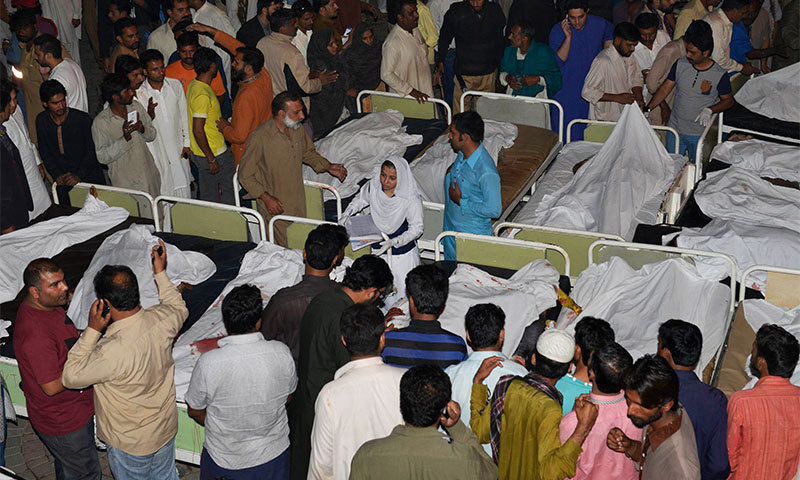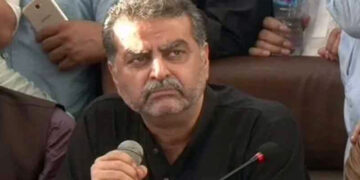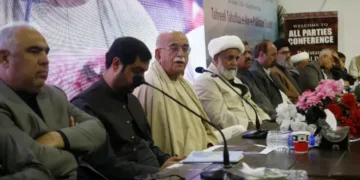
PESHAWAR: There were times when there was just one main militant group, the Tehreek-i-Taliban Pakistan which used to have one spokesman. Any major militant attack and a statement by the spokesman would be taken at face value.
But all that changed when the TTP opened its franchises and branches all over Fata and in districts where it had its influence, with their own spokesmen who often issued conflicting statements.
Things became murkier when many shadow groups emerged, some of them serving as front organisations for the existing ones to deflect responsibility as peace talks were held.
The September 22, 2013, suicide bombing at the All Saints Church in Peshawar is a classic example.
Having taken place in the wake of peace overtures made by the government of Prime Minister Nawaz Sharif, the (then) TTP spokesman Shahidullah Shahid quickly denied involvement of his outfit.
A shadowy Jandullah, led by a Marwat, claimed responsibility for the suicide bombing that had killed 127 people. But Mufti Hassan, a TTP commander, held a news conference immediately afterwards to claim responsibility for the attack.
Today, Mufti Hassan is one of the five former TTP commanders who have openly pledged their allegiance to the Islamic State of Iraq and Syria (ISIS).
It turns out that Mufti Hassan and Shahidullah Shahid are close friends and associates.
The bottom line is — the militancy scene in Pakistan is so spread and complex that at times one militant group would not know which of the other groups carried out an action.
Repudiating and rebuking each other is common and the wrangling over the Wagah border attack that left 60 people dead was not the only case. There is plenty of intelligence to corroborate this.
Consider Ehsanullah Ehsan’s statement. He sent an email to claim responsibility for the attack.
Ehsan was the chief spokesman for the TTP before he was stripped off the responsibility in July last year for speaking out against the Islamic Emirate of Afghanistan. He has denied the charge.
The now spokesman for the Tehreek-i-Taliban Pakistan Jamaatul Ahrar said in his email to media: “TTPJA claims responsibility for the Wagah border attack. Our friend Hanifullah operated this attack.
“This is the start of attacks of TTPJA and Inshaallah we will continue such attacks in the future,” he wrote.
And as in the past, he repudiated Jandullah’s claim of responsibility for the attack.
“Some other groups claim the responsibility for this attack but these claims are baseless,” he said. “We will soon release the video of the attack.” Ehsan’s claim, as of now, seems more credible.
The Punjabi Taliban led by Asmatullah Muawiya is now out of action, having declared to end its “jihad” in Pakistan and revert to Da’wat and Tableegh.
Khan Said alias Sajna who led largely the Mehsud fighting force is now back in peace talks with the government, having made it clear he had no intention of carrying out attacks inside Pakistan.
This has considerably reduced the ability of the Fazlullah-led TTP (or whatever remains of it) to carry out attacks of such a scale and nature.
The short and stocky Mullah of FM radio fame has been reduced to what he essentially was – the leader of the TTP, Swat.
A look at the growing number of targeted assassinations of peace volunteers in recent times is an indication of his renewed focus on his native valley.
This leaves Ahrar, with its resources and network, as the only likely credible suspect in the Wagah border attack.
Where does that leave Jandullah and its shadowy leader Ahmad Marwat?
There are few takers within the security establishment for this group, many of whom consider it as one of TTP’s deflection groups.
At best Jandullah was never known to operate in faraway areas, including Punjab. Many mistake it for Jandullah al-Alami, which is a different outfit operating in Balochistan and the urban jungle of Karachi.
As the TTP now stands divided into groups, some of them having been neutralised, others weakened and reduced, TTP Jamaatul Ahrar emerges as the only major group with the potential to carry out attacks inside Pakistan. And it does not make any bones about it.











